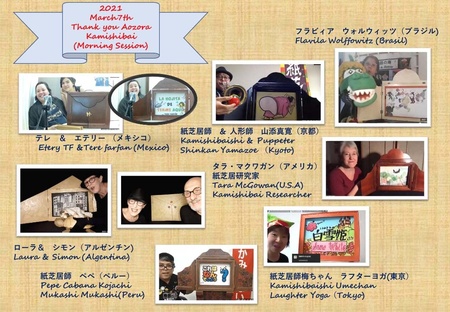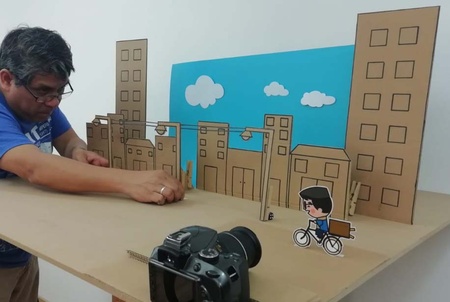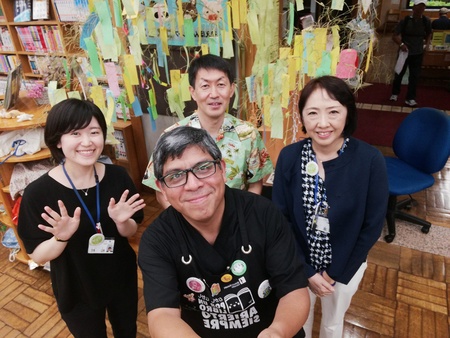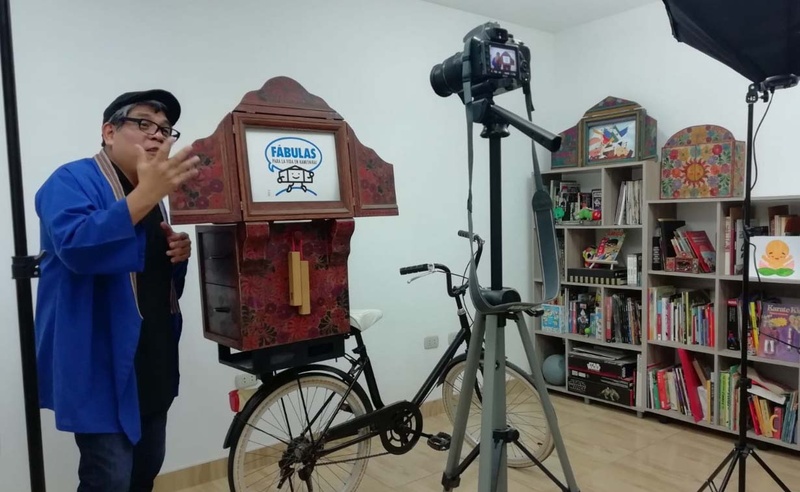His stage was theaters, children's libraries and cultural centers, where he took his bicycle with the Kamishibai, the traveling paper theater with which Pepe Cabana Kojachi became known as Mukashi Mukashi. Now the stage is on the second floor of his house, where he has set up a set to record his digital presentations that not only reach Peru, but also many countries where this form of Japanese art has been spreading.
“It is curious that at this juncture many videos have appeared about Kamishibai , there is a lot of material that is published every day, but not all the information is accurate,” says Pepe, who spent part of 2019 filming a documentary in four cities in Japan about the Japanese paper theater that has aroused great enthusiasm in different countries where it is being used as a pedagogical and children's entertainment tool.
In Tokyo, Japan, there is the group “Aozora Kamishibai”, directed by Akiko Mochizuki, who has been spreading this Japanese art virtually since 2020 and with whom Pepe Cabana Kojachi meets monthly; and in Puebla, Mexico, the “ Yolotl: stories that beat ” project directed by Rosario Ramírez, who organized the First International Reading, Oral Storytelling and Kamishibai Meeting in 2019, in which Pepe was able to participate before the pandemic. “I had several invitations in 2020, an agenda scheduled in advance, and everything fell apart,” he says from home, on the other side of the camera.

Recovering the step
In March 2020, Pepe Cabana Kojachi's first concern was being able to reunite with his two children, who were going to arrive in Peru, but whose flights were initially suspended due to the quarantine. When they were able to arrive, through humanitarian flights, they concentrated again on recovering the pace of their artistic activities, which still cannot be done in person in a country affected by its health system and the political crisis.
Creating a space to continue with his shows, improving his technical equipment (sound and lighting) and resolving the particularities of making presentations on a screen instead of a complete stage have been some of the adaptations he has made in the last year in which He returned to design and voice-over as part of his endeavors, in addition to resuming contact with cultural institutions that already knew his work.
Cultural centers such as the British Cultural or the Peruvian-Japanese, as well as the National Library of Peru, gave him the possibility of making presentations via Zoom or by video, with the challenge that that means. “I learned not to look at the screen and direct my gaze to the camera lens, we seek to improve interaction and use two cameras so that the transmission is less flat,” says Pepe, who began the quarantine doing family shows and who has ended up performing at public calls that have allowed him to continue on stage.
Projects underway
With Mukashi Cuentos I did monthly sessions for the family, birthdays and small presentations because the pandemic affected everyone, economically and health-wise, leaving the cultural side relegated. “We had to find a way to help us, so we decided to make a cost per family, one pays and everyone enters. We had up to 40 families per session with the live broadcasts,” says Pepe, who has received the permanent support of his wife and children as a work team for the recordings and broadcasts.
Then came the schools, for which he has done training, adding many teachers, and other workshops with Mukashi Mukashi Educación , in addition to presenting some of his books in virtual sessions and developing other kinds of courses such as talks and paper puppet workshops, or promotions. for the sale of his books. Part of the support has also come from its projects selected by the Metropolitan Municipality of Lima and the Ministry of Culture.
“Fables for life” is the name of the virtual scenic work that will premiere in mid-March 2021, with the Municipality of Lima, one year since the start of the coronavirus pandemic that cut short many projects but, little Little by little, it has been able to resume, such as “Reading is for everyone”, which seeks to motivate schoolchildren to create texts, illustration and narration from Kamishibai , or the “ Kamishibai Workshop for identity and reading mediation ”, for teachers.
I continue to learn
Pepe learned that it was better to record at dawn, to avoid noise leaks (“although there is always a dog barking in the neighborhood and you have to record again”), that to get into character it helps him to get ready as if he were going out on stage, putting on the complete wardrobe (perfume included), even if it is not necessary, and that one must maintain a spirit of solidarity, accepting proposals that were often well below their costs.
“We did many presentations out of solidarity because you have to be there in good times and bad, what I appreciate most is having work,” says Pepe, aware that many artists lost those possibilities due to various factors. “In my case, it has been very important to be formal,” he adds, and it is from the peace of mind of having been able to complete various projects that Pepe has been able to dedicate some time to himself.
“I wanted to do something that would allow me to disconnect, so I decided to start studying Japanese. I have classes from Monday to Friday, I get up at 5 am, classes are from 7 to 8.30 am and I am already in the sixth cycle,” says Pepe. , who continues to learn alongside boys whom he is far older in age, with his sights set on the country of his ancestors, to which he traveled for the last time in 2019, when he was preparing a Kamishibai documentary that will be released in September of this year. year, thanks to the support of various institutions and friends in Peru and Japan.
A place for Kamishibai
Pepe Cabana Kojachi seems inexhaustible, as if after taking off the prop glasses of the character of Grandpa Kichiro he became increasingly younger. “For April, a month especially dedicated to books, we will hold the “Tomodachi, friends of reading and children's books” Festival, aimed at the whole family and which will be broadcast live and with free access on our Facebook page: Mukashi Mukashi Education. In July, we will continue with the same format and access with “Sueños de Rojo y Blanco” and other events,” says Pepe, although here there is a lack of space for all of his projects.
The support of his wife Tatiana and children has helped him a lot to continue this rhythm and project himself more and more, like when they decided to adapt a space at home where they make animated shorts, video clips for songs and the Kamishibai workshops and shows that he records and broadcasts. live. In this environment he also seeks to accommodate the guests he has for the Mukashi Mukashi Education congresses and other presentations that burden his agenda and his house, where he is implementing his cultural space.

Here you have all the material you have gathered from Kamishibai , which will include a donation of more than 100 publications from the Chigasaki Library, in Kanagawa, Japan, which will arrive in Peru thanks to the sponsorship of Kyodai Remittance and coordination by Chikako Yamawaki. “There is more work coming and for more people,” says Pepe as if ending the story with a happy ending and, as in many of his shows, with a hopeful message: “If there is something that I think has been important and we learned from what happened, it was about not getting desperate or losing our cool,” he says with Japanese serenity.

© 2021 Javier Garcia Wong-Kit







